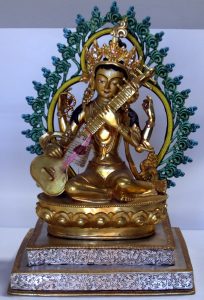The Hindu goddess Saraswati – the embodiment of knowledge, learning, music, and the arts

Stock Photos and Videos of Nepal
Shutterstock Alamy Pond5 Dreamstime 500px
In the vast expanse of time where the cosmos emerged from the divine, there existed an entity whose essence was woven into the fabric of the universe itself. Known as Saraswati, she was the embodiment of knowledge, learning, music, and the arts in Hindu mythology. Her presence was felt in every stroke of a painter’s brush, in the melody of a musician’s instrument, in the words of a poet’s verse, and in the wisdom of a devoted scholar. Saraswati was revered as the ultimate source of creativity and inspiration, guiding humanity towards enlightenment and higher consciousness.
Saraswati’s origins date back to ancient Vedic texts, where she was first mentioned as Vak, the goddess of speech. Over time, she evolved into Saraswati, the wife of Lord Brahma, the creator of the universe. Together, Brahma and Saraswati symbolized the union of knowledge and creation, establishing the importance of intellectual pursuits in shaping the world.
As the goddess of wisdom, Saraswati was often depicted with a veena (a traditional Indian string instrument) in one hand, symbolizing the harmony of the cosmos through music. In her other hands, she held a book and a rosary, representing knowledge and devotion respectively. Her serene demeanor and gentle smile reflected the peaceful essence of enlightenment that she embodied.
Throughout history, Saraswati played a significant role in shaping Indian culture and society. Her influence extended to various aspects of life, from education to the arts, inspiring generations of scholars, artists, and musicians to pursue their passions and unlock their creative potential. Temples dedicated to Saraswati were built across the country, where devotees offered their prayers and sought her blessings for success in their endeavors.
One of the most famous legends associated with Saraswati is the story of her manifestation at the confluence of the rivers Ganga, Yamuna, and Saraswati. It is believed that bathing in this holy river, known as the Triveni Sangam, can purify the soul and bestow divine knowledge upon the devotee. Pilgrims from far and wide traveled to this sacred site to pay homage to the goddess and seek her guidance in their spiritual quest.
Saraswati’s influence was not limited to India alone. As Hinduism spread to other parts of the world, so too did the worship of Saraswati. In countries like Nepal, Indonesia, and Sri Lanka, devotees erected temples in her honor and celebrated her festival with great pomp and splendor. The universal appeal of Saraswati’s teachings transcended cultural boundaries, uniting people from diverse backgrounds in their shared quest for enlightenment.
In the realm of music and the arts, Saraswati’s presence was keenly felt. She was believed to inspire artists and musicians to create works of beauty and elegance, infusing their creations with divine grace. Classical Indian dance forms like Bharatanatyam, Kathak, and Odissi were considered sacred offerings to the goddess, blending rhythm, movement, and storytelling in a harmonious expression of devotion.
As the patron of knowledge and learning, Saraswati was also revered in academic circles. Students seeking success in their studies would invoke her name before exams, seeking her blessings for wisdom and guidance. Teachers, too, looked to Saraswati for inspiration in imparting knowledge to their pupils, recognizing her as the ultimate source of all learning.
Despite her revered status, Saraswati’s influence was not without controversy. Some critics argued that her portrayal as a benevolent goddess of wisdom obscured the darker aspects of knowledge, such as manipulation, deception, and the pursuit of power. They questioned whether Saraswati’s teachings truly led to enlightenment or merely reinforced existing hierarchies and social structures.
Nevertheless, Saraswati remained a beloved figure in Hindu mythology, revered not only for her wisdom but also for her compassion and grace. Her devotees continued to worship her with fervent devotion, seeking her blessings for success in their endeavors and enlightenment in their spiritual journey. The legacy of Saraswati as the embodiment of knowledge, learning, music, and the arts endured through the ages, inspiring generations to embrace creativity and seek enlightenment in all aspects of life.
DISCLAIMER: This was generated with the help of AI. This technology is new and constantly improving. Please verify the accuracy before sharing.
